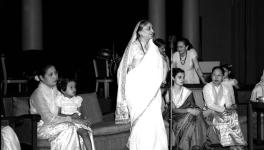Noted Psychologist Warns Indian Parents About Rising Male Violence
Representational use only.Image Courtesy: Flickr
Leading clinical psychologist and author Dr Pulkit Sharma has worked extensively with victims of sexual assault, people in abusive relationships and individuals suffering from personality disorders. In this interview with independent journalist Rashme Sehgal, he explains the possible reasons why instances of egregious violence, especially against women in personal relationships, regularly hit the headlines in India. He says one reason is the inability of family and society to help the youth, especially males, resolve the conflict between tradition and modernity, which permeates every aspect of our lives—edited excerpts.
Why are we witnessing the kind of violence we see in India today? Live-in partners being hacked to death, and sexual assaults against women on the rise?
There are several reasons. The traditional institutions that provided comfort and security allowed people to cope with sadness, made them less aggressive, and helped them discuss their problems, have broken down. Ten years ago, parents had time for children. Today, this has been replaced with gadgets. Parents have handed over parenting to phones and tablets. I have seen cases of children in class 3 or 4 who spend time watching pornography! Also, there was an emphasis on imbibing religious and ethical values to allow children to differentiate between the concepts of good and bad. Under whatever name we give it, this is no longer taught in our schools or even our homes.
I see children killing butterflies most cruelly. In my [residential] society, a young boy killed three kittens and when I asked why he informed me ‘they committed suicide’. He was not reprimanded by his parents. Rapid urbanisation has also added to our problems. These, in sum, have created a generation with low frustration tolerance that we in psychiatric jargon call LFT, and which is being manifest in—to cite one example—the increasing cases of road rage, with people willing to kill each other on this [minor] issue.
These patterns seem more manifest among young men. Is it because of their higher exposure to violence?
These boys have a lot of raw emotions they have not learnt to handle. Teenagers have aggressive tendencies, which give them a false sense of power and which, they falsely believe, help them reinforce their sense of self. They feel they are entitled to deal with their pain by destroying something.
We have a shift in the dating culture and consumption patterns, but is change superficial, with no apparent substantive or normative shift in gender equality?
Young men today watch a great deal of online media, which often has a great deal of sexual and aggressive content. This leaves them desensitised, and they no longer consider aggressive behaviour extreme. Instead, they treat it as something normal. Women’s empowerment is taking place, but the issue is how [will] men let go of their aggressive tendencies, which they mistake for masculine behaviour? So, when empowered women contradict or reject [these] men, they cannot take it. And in extreme cases, this manifests in acid attacks and brutal murders of women.
Today, we witness a younger generation of men going through an extended period of adolescence that extends into their thirties. They do not want the responsibility, for example, of marriage. They want to holiday over the weekends and generally lead a life of extended fun and frolic. Traditional-minded men want to have fun with women they find sexually desirable, who are open-minded and independent, but they still carry many insecurities deep down. Their relationships often turn abusive and manipulative, especially when women threaten their dominance.
But how do we explain an Aaftab Poonawala, who allegedly murdered his girlfriend, Shradda Walker, after an argument, then concealed her body in the most gruesome manner? Or a Sahil Gehlot, who allegedly killed his first wife and married another woman on the same day. What exactly is happening?
Such men have no conscience left, no sense of guilt, no remorse or sense of loss. The relationship is not for the other person. It exists only for themselves. All such men are concerned about is they should not get caught. It is a dark tunnel. For such a man, people are like objects. [Gehlot] killed his lover, which he believes gave him the liberty to remarry. Such men claim to have a modern demeanour, but these externalities are a sham.
Many couples meet on dating sites today. Are perceptions about women likely to be different on these sites?
The conflict between tradition and modernity continues across all aspects of our lives. Some men on dating sites may project themselves as progressive and supportive of women’s liberation, but often, it can be a façade. Many remain conservative at heart. They want to be with independent women, but I have come across many cases where, after a few meetings, I realise they have devalued these women in their hearts. Take the example of women who are outdoors after, say, 11 pm. They could be returning from work, or there could be other reasons for being out late. But many men who see them believe they are ‘available’.
Are we following what many say is a kind of ‘American model’ in terms of a highly consumerist lifestyle that also has very violent undertones?
Yes. This model sends out very wrong signals, and this is manifest in many of the mental health surveys conducted in the United States, where sexual, alcohol and drug abuse is pretty rampant. This is made worse by the increasing number of cases of gun violence. The institution of marriage has also disintegrated, and we now have an entire younger generation which has grown up under very challenging circumstances. But there is a major difference between the United States and India. Treatment for mental health-related issues is freely available in the United States, and they have mental health workers who will help find apartments and jobs for people suffering from psychological disorders or substance abuse. We have practically no mental health institutions in India, and our support systems are negligible. We are going to witness increasing aggressive and violent behaviour in the years to come, and I advise my patients they must learn to be very watchful.
What is the role of families and parents here? Walker, for instance, could not explain her disturbing dreams to her parents. She went home after her mother died but stayed barely two weeks before returning to the abusive Poonawala, who killed her.
Parents have no understanding of the world their children are living in. They have no understanding of their aspirations and dreams. There is no communication between them. Parents do not even show a minimal amount of human curiosity to try and understand what is going on in their daughters’ lives. This is especially true of daughters in live-in relationships. It is as though they have blocked her out completely—“Kharab rastey chal rahi hai—She is a bad girl.” With children and the young left on their own in this highly-consumerist society, they have turned to social media to find solutions to their problems.
As violent behaviour accelerates, is the government, the Ministry of Women and Child Development, intervening to help families cope?
The kind of callousness on display is horrible to witness. Apart from posting some videos on social media, I do not see the government doing any work. The young have been left to fight their own battles without support from families or communities. How will these vulnerable minds make sense of what is happening around them? They flounder and fail, and this violence is a manifestation of these problems.
Rashme Sehgal is an independent journalist.
Get the latest reports & analysis with people's perspective on Protests, movements & deep analytical videos, discussions of the current affairs in your Telegram app. Subscribe to NewsClick's Telegram channel & get Real-Time updates on stories, as they get published on our website.
























